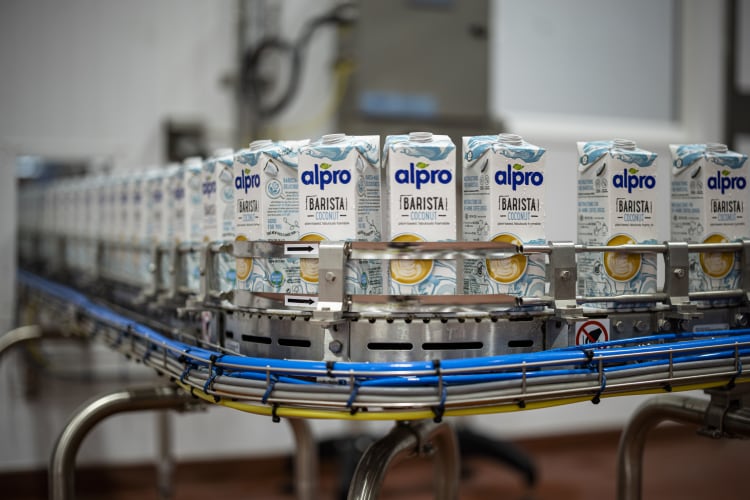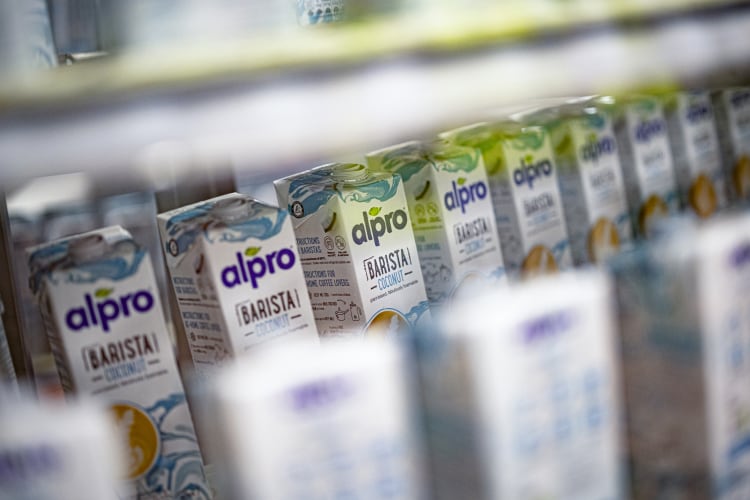Danone-owned Alpro plans to invest around £41m in the UK, increasing production capacity for its plant-based products at its manufacturing facility in Kettering and ‘enhancing’ its sustainability credentials. The spend includes £17m for a new high-speed production line, a ‘state-of-the-art’ trigeneration unit and a water plant that will reduce energy use, carbon emissions and water requirements at the site.
At a launch event, Alpro General Manager Sue Garfitt described the news as a 'landmark moment' for the business in the UK, a market the Belgian brand entered in 1996.
Alpro has ‘shifted axis’ from niche to mainstream
When Alpro was first available in the UK, the alternative milk products were viewed as a niche catering to people with dietary restrictions, Garfitt reflected. Today, this has changed.
The UK plant-based dairy-free sector has witnessed ‘exponential growth’ and is now worth £636m, according to figures from IRI. Alpro has played an important role in extending the category, Garfitt believes. With value sales of £259.6m it is the category lead, bringing 2.2m new shoppers into the space last year. That represents 70% of the consumers who were new to the alternative milk sector.
“We’ve worked incredibly hard to build the category to the £636m opportunity that it is today. We've no intention of slowing down. There is no reason why we should,” Garfitt told attendees at an event to unveil the Kettering investment. “Our business has shifted in its axis, no longer just a niche but very much mainstream and available for every consumer.”
This move into the mainstream has allowed Alpro to grow its brand value. Today, it is the 27th largest brand in the UK, up from 100th place seven years ago, the company revealed.
Garfitt intends to build on this momentum by continuing to encourage more shoppers to try plant-based milk alternatives. “We have bold ambitions to continue this trajectory by inspiring more and more consumers to enjoy the many benefits of plant-based with Alpro.”
Of course, driving category growth is easier said than done. But Alpro believes two mega-trends will continue to support the extension of plant-based appeal: health and sustainability.

Sustainability in Alpro’s 'DNA’
Garfitt said that sustainability has become a touch-paper issue for consumers, particularly millennials and generation Z. She also noted that globally the world stands at a ‘pivotal moment’ that demands action to lower the impact of food production and consumption.
“If we carry on in the way we are producing and eating food, using the Earth's resources as we currently are, we are going to need two planets by 2030,” the UK business lead stressed, noting that food accounts for one-quarter of greenhouse gas emissions.
“What can we do to counteract it? What can we do from a food and drink industry perspective?” she asked.
One of the answers Alpro advocates is ‘eating more plant-based’. If a shopper choses to ‘put plants first for one day’ it could save 1,500 litres of water and 2kg of carbon, Garfitt claimed. “If we do that as individuals, as families across the UK, that's the benefit we could create,” she said.
“For us its paramount that sustainability is seen by everybody as the vital movement that it is. Our mission has been clear from our foundation and has been cemented further in our ‘Feeding Our Future with Plants’ programme… about how we promote a more measurable dietary shift towards plant-based eating by 2025.”

For Alpro, its not just what we eat, it is about how and where it is produced. The Kettering site, the ‘home’ of Alpro’s UK plant-based business, has reduced energy consumption per product by more than -40% in the last 13 years and operates a zero waste to landfill.
The latest investment round aims to make production at the facility further efficient still. It includes the instillation of a combined cooling, heat and power unit to simultaneously generate electricity, heating and cooling from the combustion of gas. This will allow the factory – which runs on 100% renewable electricity – to reduce energy consumption and carbon emissions, the company said. Meanwhile, a new water treatment plant will cut water use and see 218 m3 of water being reused on site every day.
Local production is also important for Alpro’s sustainability story, Garfitt continued. It will cut the number of trucks bringing Alpro’s products into the country by three-quarters, reducing carbon emissions linked to transportation.
“At this moment that's a very important message, not least because it enables us to produce here... but also because it helps us to make sure we don't have to transport products from Europe to the UK, cutting carbon emissions,” Garfitt explained.
“Alpro is leading the way towards a more sustainable and regenerative planet by putting our impact on the air, climate, water, land and biodiversity first in our business practices.”
Plant-based for the health of people as well as planet
The Alpro UK executive believes that increasing plant-based consumption isn’t just good for the planet, it is good for people too. In particular, she stressed, raising the number of plant-based products in our diets will deliver population health benefits.
“There’s never been a better time to choose plant-based, not only for the health of the planet but also the nation. There is a growing consensus among policy makers, scientists and international organisations that eating more plant-based is a fundamental part of the solution for the challenges of today and tomorrow.”

Alpro pointed to evidence from England’s National Food Strategy, that found poor diet contributes to 64,000 deaths a year in England alone and costs the economy £74bn. However, a study published in the Journal of Nutrition found that British government could reduce its healthcare and societal costs by £5.21 billion if just 10% of the UK population would embrace plant-based foods in their diet, Nutrition Manager Kate Arthur noted.
“There's a growing understanding that eating more plant-based is a fundamental part of the solution to the challenges of today and tomorrow. This is a consensus among many policy makers, scientists and international organisations, from the likes of the World Health Organization, EAT Lancet and the European Commission,” Arthur claimed.
“Plant-based foods - things like fruits, vegetables, beans, pulses, nuts, seeds, wholegrains and plant-based alternatives - tend to be higher in fibre, they are heart-healthy because they are low in saturated fat, and they are packed with a range of vitamins and minerals.”
Arthur said all Alpro products are 'really healthy', with no saturated fat, sugar, salt. "They are not high fat sugar salt foods, our whole range is a very healthy range," she stressed.
Garfitt added: “What sets us apart is the fact that in all our decisions we consider the health and sustainability of the planet and of course of its people.”
Growing distribution in ‘white-spot’ spaces
Alpro wants to extend its ‘mission’ to bring 'healthy and sustainable' plant-based products to consumers by increasing accessibility and availability.
Today, the brand is available in over 25,000 UK stores – more than twice as many as any other plant-based brand, Garfitt noted. “But we won't stop there. There are still many stores we are not in, there are still many occasions we aren't present in, you still can't go to some places and find an Alpro product and that's really our mission. We want to accelerate that further [to] bring the health of plant-based products to the nation. It also enables us to think about how we make a contribution to the health of our planet and the sustainability of our planet.”
Garfitt told FoodNavigator that Alpro wants to ‘make sure everywhere where consumers are, there is an Alpro plant-based option’. And while the brand benefits from relatively strong distribution, across retail and foodservice, she has identified a number of ‘white spot’ opportunities.
“We are working to fulfil that mission, but there are some specific white spots... There are lots of other places we would want to be. If you are in the travel arena, if you are in the hospitality arena, there are still white spots for us to target and to be made available.”

Foodservice is a particularly important channel to support consumer trial and uptake, the plant-based expert continued. Alpro continues to make in-roads in this space.
“We have a very large business in coffee chains, we work very closely with Costa Coffee, Starbucks, Pret a Manger, all of the coffee chains. That accounts for about 10% of our overall business today. We see that as an area of opportunity.
“Hot beverages enable us to be able to try plant-based in a coffee, breaking any barrier that there might be that consumers have around taste. It makes it very accessible. It's also very universal. If you think about a Starbucks or a Costa there are people of all ages. It is very important in encouraging people to consume in that arena,” Garfitt explained.
Looking to the future, Alpro wants to deliver positive impact on the health of people and planet through growth, playing a role in the UK’s efforts to shift to net zero. “We want to play our part in the 10 years that the UK has set out to change the structure of how we work in a more sustainable way and how we live in a more sustainable way. I firmly believe Alpro has an opportunity as part of that.”




